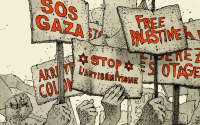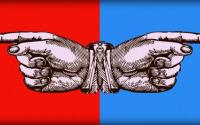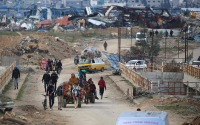2 March 2007Kevin Berger
For somebody in America, Evan Kohlmann has a remarkably intimate view of the Iraq insurgency. In 2004, he founded GlobalTerrorAlert.com, a clearinghouse of virtually every communiqué -- video, audio, Internet, printed -- issued by insurgent groups in Iraq. For three years, Kohlmann has pored through every one of them, with the help of Arabic translators, and emerged with a clear-eyed view of who is fighting whom in Iraq and why. Given his insights, Kohlmann has been put to work as a consultant by the U.S. Department of Defense, the Department of Justice, the FBI and the CIA.
Spending time in Kohlmann's archives is an extraordinary experience. It strips away the cloudy myths of the insurgency steamed up by U.S. politicians and pundits and leaves you with a bracing portrait of roving insurgent groups, more like neighborhood gangs, with their own identities and insignias, progressively growing more violent. I wanted to talk to Kohlmann for the simple reason that as much as I follow the news about the Iraq war, I have always felt slightly frustrated at not knowing who the enemy really is. Kohlmann says I'm far from alone. And he's talking about people way over my head. "I find it tragic that people in Washington, D.C., who are the heads of major congressional committees, and deciding things about Iraq, don't know the difference between Sunnis and Shiites," he says. Kohlmann insists he is nonpartisan. He spoke from his office in New York.
Every day you look at Iraq through the lens of insurgent videos and Internet postings. What do you see?
A picture of fundamentalism. Shiite fundamentalism clashing with Sunni fundamentalism clashing with American fundamentalism. We have tried imposing things upon Iraq that are totally foreign to it. Now each side is unwilling to acknowledge the right of the other to have a voice in what's going on. It's a disaster.
Describe the insurgency.
You have to be careful when you say "insurgency." You have to distinguish between the Shiite militias and the actual insurgency, which is the Sunni groups. Most of the Shiite militia activity is not directed at the U.S., it's directed at the Sunnis. The Sunni insurgency, meanwhile, is directed at everyone -- the U.S., the Iraqi government, the militias.
The best way to divide it up is into three camps. You have Sunni nationalists, initially a large portion of the insurgency; the moderate Sunni Islamists, who use Islamic terminology and talk about establishing a government based on Sharia law; and you have the Salafists, like the group Al-Qaida in Iraq. To them, the fight is not about preserving the borders of Iraq, it's about revolution, about rebuilding something completely new on the basis of some kind of idyllic Muslim empire.
What drives people to join the insurgency?
I've called up families of fighters and when I ask that question, the response is always the same: Wouldn't you? They are extremely upset about what's going on in Iraq. Some of them have a burning hatred for the U.S. They see the U.S. as imposing its will on their countries. Some of them have a burning desire to be a missionary and martyr for Islam. You have people who have broken out of prison and gone to fight in Iraq. It's now a vacuum sucking in every disaffected voice in the region.
How has the insurgency evolved?
When the U.S. invasion began in 2003, it was mainly Baathists, ex-Iraqi military, and Saddam loyalists. They were Iraqi nationalists, opposed to foreign occupation, who saw Iraq as a competitor with Egypt for the control of the Arab world. It was an issue of national pride. Video recordings and communiqués were coming out from everybody who had an AK-47. But as the war dragged on, some of these groups started coalescing; others were destroyed. Only the strongest, the most hardcore, the best financed, the people with the most training, survived, despite airstrikes and the arrest of their senior leaders by the U.S. military.
Do you call the insurgents "terrorists"?
No. The nationalist insurgents have done a lot of really brutal things. But in general they are people opposed to foreign occupation. If foreign occupation were removed, they wouldn't necessarily sit down and shake hands with Shiites. But at the end of the day, they would like to see a peaceful Iraq where Sunnis and Shiites can at least coexist with each other. Terrorists are people who set off bombs in marketplaces and deliberately kill innocent civilians for no good reason. Any suicide bombing is a terrorist act. It's not an insurgent act. There is no military objective in it. The vast majority of suicide bombings that take place in Iraq are either the work of al-Qaida or al-Qaida-linked groups. Al-Qaida are the terrorists.
Who constitutes al-Qaida in Iraq now?
It includes everyone from past conflicts in Afghanistan, Bosnia and Chechnya to people from Saudi Arabia, Egypt, North Africa, Syria and Jordan. A growing number of Iraqis continue to join its ranks every day. The people in the nationalist groups feel intensely hurt to see Iraq being torn apart. This is their homeland. And now their groups are taking on an Islamic tinge or else becoming straight-up jihadist groups controlled by al-Qaida. A lot of people joining the jihadist groups are now convinced there is no future left for Iraq, that the only future left is with al-Qaida, the only people who can protect them is al-Qaida.
David Kilcullen, an astute counterinsurgency expert, told George Packer in the New Yorker that what drives a lot of young men to become jihadists is a "sense of adventure, wanting to be in the big movement of history that's happening right now." Do you agree?
Oh, yeah. For some of these guys, it's like a safari. They see themselves as knights of the round table. In fact, that's how al-Qaida now sells the insurgency to them: Are you a chivalrous knight or a coward?
Has the U.S. invasion, in fact, strengthened al-Qaida?
Definitely. And this is the depressing thing. The hardcore true believers of al-Qaida at one time were probably 10 percent of the insurgent groups. Now they're 50 percent. Al-Qaida is growing in places it shouldn't. You have groups like the Islamic Army of Iraq that have transitioned from being traditional insurgents to extremist ones. Or take a popular insurgent group called the 1920 Revolution Brigades. The very name of the group has a nationalist, not Islamist meaning. And yet very recently, the head of al-Qaida's Islamic State in Iraq issued a statement in which he said that people from the 1920 Revolution Brigade were now fighting alongside al-Qaida. The U.S. is failing miserably at containing the spread of al-Qaida.
Why are the more moderate Muslim groups siding with al-Qaida?
They have no choice. There's a group called the Iraqi Islamic Resistance Front. They are far from angels. They recently released a video of supposedly a chemical rocket attack on a U.S. base in Samarra. But they were also the subject of a flier that was being posted around in Ramadi. The flier was signed by al-Qaida and said the Front was working with the Iraqi Islamic Party, the Iraqi government, and so is no longer a legitimate group. The Front was furious. They issued a statement saying, "We're not working with the government, we're with you guys, so don't issue these kinds of accusations." So there's a lot of pressure to work with al-Qaida or be targeted by it.
Does that message go out to people on the streets too?
Yeah, sure. That's the sad thing. If you work with the U.S. or the Iraqi government, you are targeted by al-Qaida. If you work with anyone else, you are targeted by the Shiites. It's a lose-lose situation. And what's amazing is this slide has all happened over the past 12 months. It's pegged to one singular event, the spark, which is the 2006 bombing of the Askariya Mosque in Samarra. Al-Qaida never claimed direct responsibility for it but they did call the mosque the heretical idol and mocked the fact that the Shiites were upset about it. Afterward, it was saying, "We've been fighting Shiite militias all along." To broaden its appeal, it said, "We're declaring the formation of an Islamic state in Iraq. This is no longer just an insurgent movement. We now have a state that we're fighting for, so come and join our cause. You're either with us or against us." Sure enough, we started seeing more groups edging toward al-Qaida's jihadists umbrella network.
Would al-Qaida have blown up the mosque if the U.S. wasn't in Iraq?
There wouldn't be an al-Qaida in Iraq if the U.S. wasn't there. The story of al-Qaida in Iraq begins in 2003. We handed al-Qaida exactly what it was looking for, a real war in the Middle East where it could lead the way. Al-Qaida is like a virus. It goes for weak victims and it uses conflicts to breed. Iraq gives al-Qaida a training ground, a place to put recruits in combat. If they come back from battle, you have people who have fought together, trained together, you have a military unit. As Richard Clarke has said, it was almost like Osama bin Laden was trying to vibe into George Bush the idea: "Invade Iraq, invade Iraq." This was an opportunity they seized with amazing alacrity. As brutal and terrifying as what they've done is, you have to acknowledge they capitalized on an opportunity that we handed them.
What happened to the U.S. message of democracy?
It totally failed. The idea of Western-style democracy in Iraq doesn't appeal to anyone. It was our own myth. We thought that if we get rid of Saddam Hussein, people would come together and celebrate and democracy would reign throughout the Middle East. The people who thought that up are people who think Iraq is like Texas. Iraq is not Texas. To Iraqis, tribal affiliations, religion and family mean a lot more than saying, "I'm from Iraq." You know we're doing a bad job of communicating our own message when we're losing the propaganda war to people who cut other people's heads off on camera. Think about it: People in one of the most Westernized countries in the Middle East would rather trust al-Qaida than the United States. That's a terrible sign of things to come.






